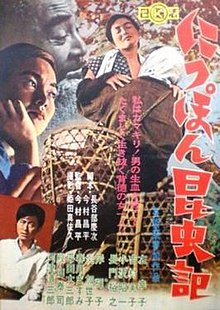fiction.wikisort.org - Movie
The Insect Woman (にっぽん昆虫記, Nippon konchūki, lit. "Entomological Chronicles of Japan"[4]) is a 1963 Japanese drama film directed by Shōhei Imamura. It was entered into the 14th Berlin International Film Festival, where Sachiko Hidari won the Silver Bear for Best Actress award.[5] It was also awarded numerous national film prizes.[6]
| The Insect Woman | |
|---|---|
 | |
| Directed by | Shōhei Imamura |
| Written by |
|
| Starring |
|
| Cinematography | Shinsaku Himeda |
| Edited by | Matsuo Tanji |
| Music by | Toshiro Mayuzumi |
Production company | Nikkatsu |
| Distributed by | Nikkatsu |
Release date |
|
Running time | 123 minutes |
| Country | Japan |
| Language | Japanese |
| Budget | $165,000[3] |
| Box office | $1 million[3] |
Plot
The film follows Tome, a young woman born to a rural lower-class family in the Tōhoku region in 1918, who, after a long series of mishaps, rises to the status of a madam in the post-war era. When she is sentenced to jail, her daughter Nobuko becomes her patron's lover, but later steals his money to use it for building up a farming commune.
Cast
- Sachiko Hidari as Tome Matsuki
- Jitsuko Yoshimura as Nobuko
- Emiko Aizawa as Rui
- Masumi Harukawa as Midori
- Emiko Higashi as Kane
- Daizaburo Hirata as Kamibayashi
- Seizaburo Kawazu as Karasawa
- Teruko Kishi as Rin
- Tanie Kitabayashi as Madam
- Kazuo Kitamura as Chuji
- Asao Koike as Sawakichi
- Masakazu Kuwayama as Owagawa En's Lover
- Hiroyuki Nagato as Matsunami
- Shoichi Ozawa as Ken
- Sumie Sasaki as En
- Taiji Tonoyama as Foreman
- Shigeru Tsuyuguchi as Honda
Production
In a 1977 interview, director Imamura explained that he had chosen Hidari for the role due to her vitality and energy, which had impressed him in the film The Maid's Kid (Jochukko, 1955).[7] Yet, according to Hidari, she and Imamura disagreed profoundly on the way she should play her character, calling him a "chauvinist" in retrospect for his bullying the then pregnant actress by e.g. insisting on multiple re-takes in delicate scenes.[8]
Release
The Insect Woman was released in Japan on 16 November 1963,[1][2] earning $500,000 in four weeks.[3] It was re-released with Getsuyōbi no Yuka in February 1964, earning a similar amount.[3]
The film was released as a region 1 NTSC DVD in 2009 as part of The Criterion Collection's Shohei Imamura DVD box[9] and as a region B Blu-ray in 2011 by Masters of Cinema.
Reception
Variety magazine declared the film being "potent adult film fare by any nation's standards" and praised the camera work by Masahisa Himeda and performances by Sachiko Hidari, Kazuo Kitamura and Jitsuko Yoshimura.[6] The review noted that the film takes place over a period of 45 years in an episodic technique "consciously causing viewer alienation".[6]
The film won 14 awards in Japan,[6] including the Blue Ribbon Award for Best Film[10] and Kinema Junpo Award for Best Film of the Year.[11]
References
- "にっぽん昆虫記 (The Insect Woman)" (in Japanese). Nikkatsu. Retrieved July 6, 2021.
- "にっぽん昆虫記 (The Insect Woman)". Kinenote (in Japanese). Retrieved July 6, 2021.
- "Le Sexy Hot Japan". Variety. 8 April 1964. p. 5.
- Tessier, Max (1997). Shohei Imamura. Cinematheque Ontario. p. 60. ISBN 9780968296905.
- "Berlinale 1964: Prize Winners". Berlin International Film Festival. Retrieved July 6, 2021.
- "Film reviews: The Insect". Variety. June 24, 1964. p. 7.
- Tessier, Max (1999). "Shohei Imamura interview". In Quandt, James (ed.). Shohei Imamura. Toronto International Film Festival Group. p. 61.
- Raine, Michael (2019). "The Insect Woman, or: The Female Art of Failure". In Coleman, Lindsay; Desser, David (eds.). Killers, Clients and Kindred Spirits: The Taboo Cinema of Shohei Imamura. Edinburgh University Press. p. 132. ISBN 9781474411813.
- "The Insect Woman". The Criterion Collection. Retrieved July 6, 2021.
- "1963 Blue Ribbon Awards" (in Japanese). Archived from the original on 7 February 2009. Retrieved 4 August 2021.
- "The Insect Woman: Awards". IMDb. Retrieved 4 August 2021.
External links
- The Insect Woman at IMDb
- The Insect Woman at the Japanese Movie Database (in Japanese)
- The Insect Woman: Learning to Crawl an essay by Dennis Lim at The Criterion Collection
На других языках
- [en] The Insect Woman
[ru] Женщина-насекомое
«Женщина-насекомое», другое название — «Японское насекомое»[комм. 1] (яп. にっぽん昆虫記, ниппон контюки; англ. The Insect Woman) — японский чёрно-белый фильм-драма, снятый режиссёром Сёхэем Имамурой в 1963 году. Это мрачная, по большей части неприятная история, рассказывающая о женщине, которая покинула свою горную деревню на северо-западе и стала проституткой в Токио. Режиссёр снял картину, в которой исследует жизнь этой женщины, словно учёный, исследующий под микроскопом насекомое. Фильм удостоен ряда престижных национальных кинопремий, а актриса Сатико Хидари получила приз «Серебряный медведь» за лучшее исполнение женской роли на международном кинофестивале в Западном Берлине.Другой контент может иметь иную лицензию. Перед использованием материалов сайта WikiSort.org внимательно изучите правила лицензирования конкретных элементов наполнения сайта.
WikiSort.org - проект по пересортировке и дополнению контента Википедии